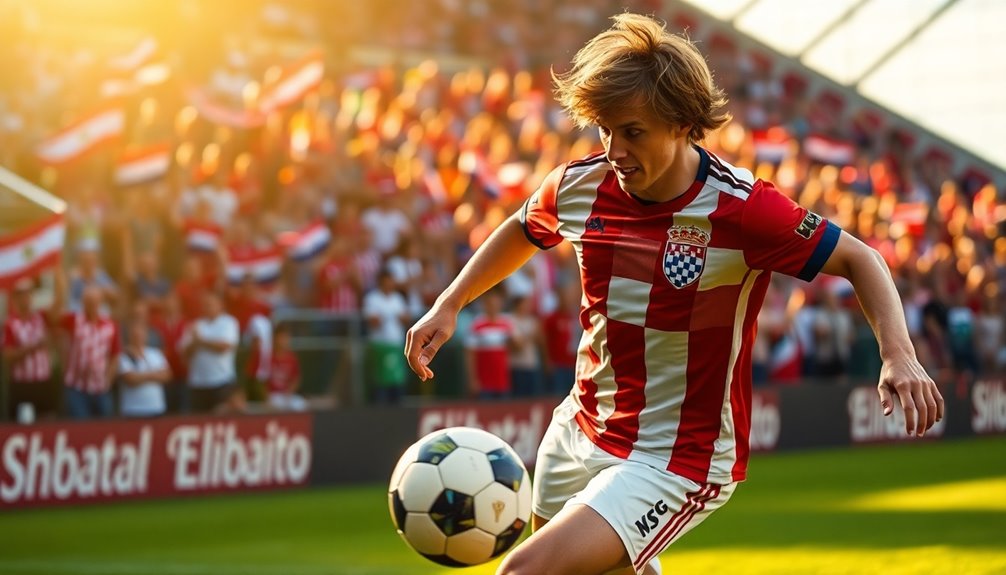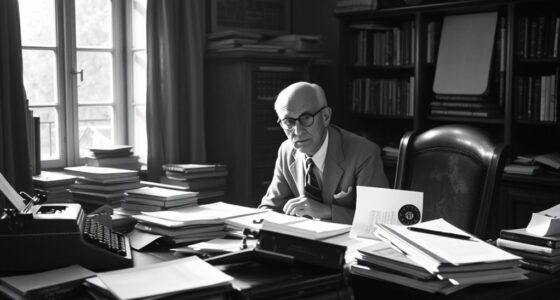Luka Modric, born on September 9, 1985, in Zadar, Croatia, rose from a refugee background to become a football legend. You'll see how he started at NK Zadar before joining Dinamo Zagreb, and then made his mark in the Premier League with Tottenham Hotspur. Modric captained the Croatian national team to the 2018 World Cup final, winning the Golden Ball for best player. His tenure at Real Madrid brought five Champions League titles and the prestigious Ballon d'Or. Modric's inspiring journey from adversity to greatness showcases his impact on football, and there's much more to explore about his legacy.
Key Takeaways
- Luka Modrić was born on September 9, 1985, in Zadar, Croatia, developing a passion for football from a young age.
- He began his professional career with Dinamo Zagreb, winning multiple league titles before transferring to Tottenham Hotspur in 2008.
- Modrić captained Croatia to the 2018 World Cup final, earning the Golden Ball as the tournament's best player.
- He secured five UEFA Champions League titles with Real Madrid, becoming a key figure in their success from 2014 to 2018.
- Modrić's legacy includes being the first Croatian to win the Ballon d'Or and inspiring future generations of footballers.
Introduction
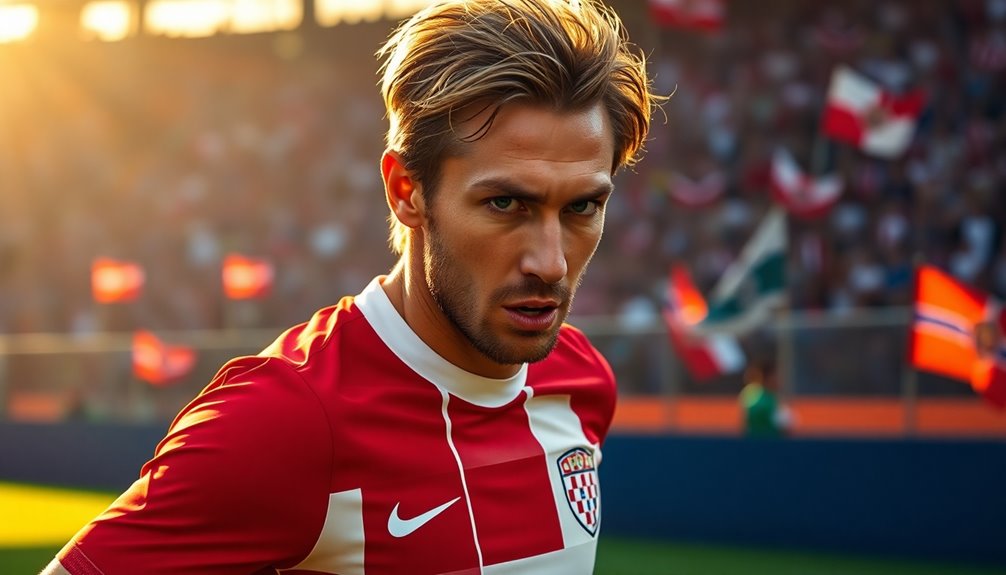
Luka Modric, born on September 9, 1985, in Zadar, Croatia, has become one of the most celebrated footballers in the world. His journey began amid the turmoil of the Croatian War of Independence, which instilled resilience in him. You can trace his early passion for football back to his youth career at NK Zadar, but it was at Dinamo Zagreb where he honed his exceptional talent as a midfielder. At 16, he joined Dinamo's youth team, developing skills that would shape his professional career.
Modric made his professional debut with Dinamo Zagreb, winning multiple league titles and catching the eye of major European clubs. In 2008, he transferred to Tottenham Hotspur, where he adapted to the Premier League and became a pivotal player, leading Spurs to their first UEFA Champions League qualification.
His dream of joining Real Madrid came true in 2012, and Modric quickly became integral to their success, contributing to several UEFA Champions League titles. His remarkable achievements culminated in winning the Ballon d'Or in 2018, solidifying his legacy as a midfield maestro for both the Croatian national team and club football.
Croatian Footballing Legend
Croatia's footballing heritage shines brightly through the achievements of its most illustrious players, and few embody this legacy like Modric. Luka Modrić, born in Zadar, has cemented his status as a Croatian midfielder of extraordinary talent. His exceptional vision and playmaking abilities have made him one of the best midfielders of his generation.
Leading the Croatia national team to the historic 2018 World Cup final, Modrić showcased his prowess on the world stage, earning the prestigious Golden Ball award as the tournament's best player. This recognition not only highlighted his individual brilliance but also underscored the collective achievement of a nation.
At Real Madrid, Modrić has enjoyed a prolific club career, racking up 17 major trophies, including four UEFA Champions League titles. His influence in midfield has been pivotal to the club's success, demonstrating tactical intelligence and leadership. In 2018, he made history as the first Croatian player to win the Ballon d'Or, breaking the decade-long stranglehold of Lionel Messi and Cristiano Ronaldo. Modrić's legacy as a Croatian footballing legend continues to inspire future generations.
Five-Time Champions League Winner
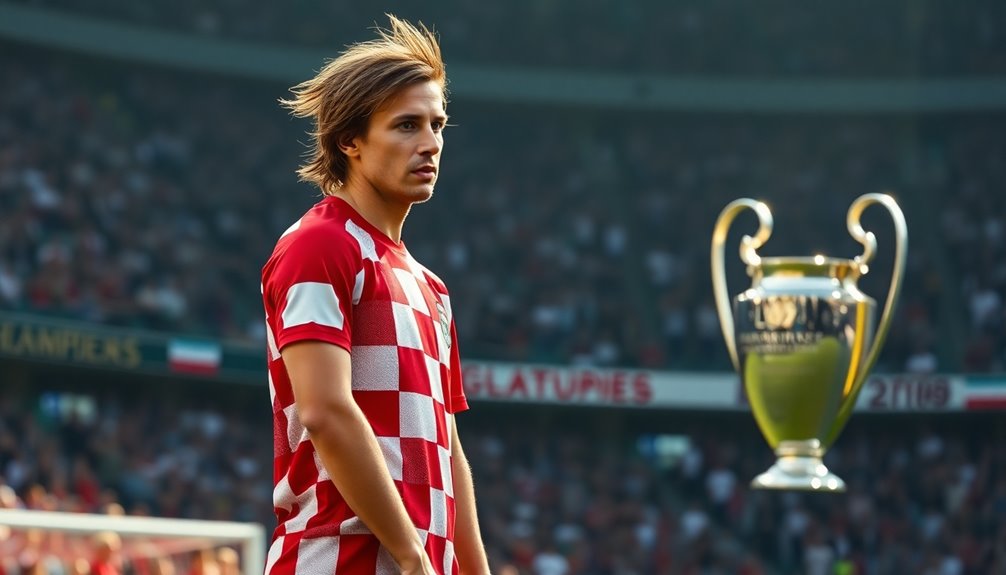
Modrić's impact on the Champions League is a testament to his exceptional skill and dedication. As a key midfielder for Real Madrid, Luka's contributions have been pivotal in securing five Champions League titles during his time with the team. His journey began with the 2013-14 season, where his performances laid the groundwork for future successes.
In the 2014 Champions League, he played a vital role in crucial matches, helping Madrid clinch the title. His influence only grew in subsequent seasons, particularly during the 2017-18 campaign, where he was instrumental in securing the club's 13th title. Luka's remarkable vision and playmaking abilities shone through, earning him the accolade of the tournament's best midfielder.
One of his standout moments came in the memorable 2018 final against Liverpool, where he not only showcased his skills but also scored a pivotal goal. Modrić's consistent performances elevated Real Madrid's midfield, allowing the team to dominate European football. His legacy as a Champions League winner is cemented, reflecting both his talent and the success he brought to the club.
Frequently Asked Inquiries
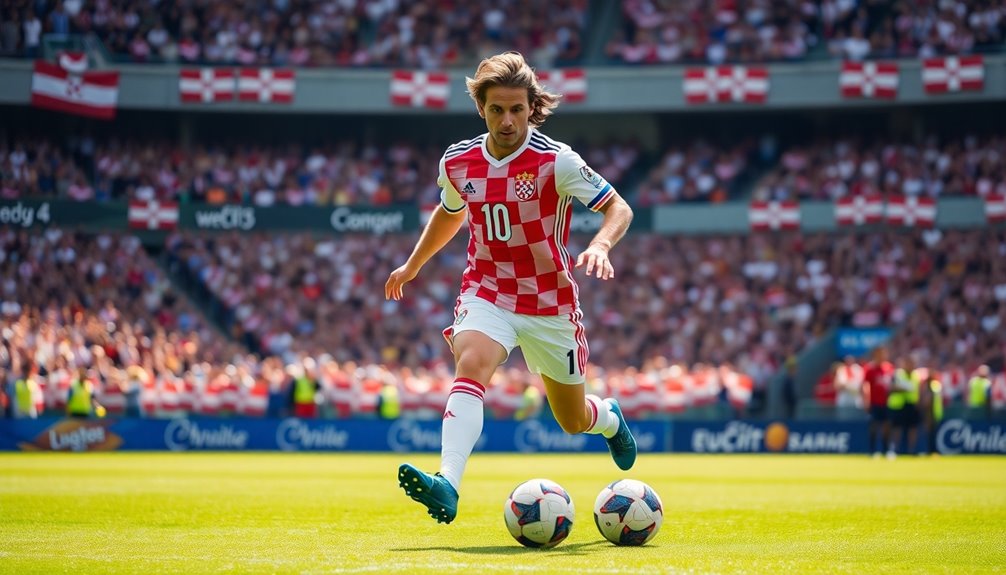
Curiosity often surrounds the life and career of Luka Modrić, as fans and aspiring athletes seek to understand the journey of one of football's greats. Born in Zadar, Croatia, in 1985, Luka faced hardships during the Croatian War of Independence, which shaped his early years. Many wonder how he transitioned from a refugee to a standout player.
You might ask, what were his significant career milestones? Modrić started at Dinamo Zagreb before moving to Tottenham Hotspur in 2008, where he honed his midfield skills and helped Spurs reach the UEFA Champions League in 2010. His transfer to Real Madrid in 2012 marked a turning point, leading to four Champions League titles and earning the prestigious Ballon d'Or in 2018.
Fans often inquire about his international achievements. As captain of the Croatian national team, Modrić led his country to the 2018 FIFA World Cup final, receiving the Golden Ball for being the tournament's best player. His ability to inspire and perform at the highest levels continues to resonate with football enthusiasts worldwide.
Career Highlights and Statistics

Luka Modrić's career is marked by extraordinary achievements and impressive statistics that underscore his impact on football. As a midfield maestro, you've witnessed his dominance with Real Madrid, where he's secured 17 major trophies, including 5 UEFA Champions League titles and 4 La Liga championships. His performances on the pitch have earned him the prestigious Golden Ball in 2018, making him the first player outside of Lionel Messi and Cristiano Ronaldo to achieve this in over a decade.
Modrić's leadership shone brightly as he captained the Croatian national team to the final of the 2018 FIFA World Cup, where he was awarded the Golden Ball for being the tournament's best player. This moment solidified his status as one of football's elite. Additionally, you might be impressed to know he was included in the FIFA FIFPro World XI for five consecutive years from 2015 to 2019, reflecting his consistent excellence.
With over 100 appearances for the Croatian national team, Modrić has played a pivotal role in their success in major tournaments since making his debut in 2006, showcasing his enduring talent and dedication to the sport.
Conclusion

As you reflect on Luka Modrić's extraordinary journey, it's clear that his influence on football transcends mere statistics and accolades. He's not just a player; he's a midfield maestro who has redefined modern football with his vision and precision. Winning the Golden Ball after leading Croatia to the World Cup final in 2018 solidified his status as one of the game's greats.
His achievements with Real Madrid speak volumes, as he's collected numerous trophies while maintaining peak performance well into his late 30s. Modrić's legacy isn't solely measured by the individual accolades or the impressive list of trophies; it's also about his inspirational journey. Growing up in a war-torn country, he faced challenges that many would find insurmountable, yet he rose to become a pivotal figure for the Croatian national team.
In a world where football is often dominated by superstars, Luka Modrić stands out not just for his talent but for his unwavering determination and leadership. His story will inspire future generations of players, proving that greatness comes from persistence, skill, and heart.
Frequently Asked Questions
What Languages Does Luka Modric Speak?
You'll find that Luka Modric speaks Croatian as his native language, and he's fluent in English from his time in the Premier League. He also knows some Spanish from playing at Real Madrid.
What Are Some Fun Facts About Modric?
You'll find it fun that Luka Modric's a Golden Ball winner, scored his 100th goal in 2020, and overcame adversity as a refugee, showcasing incredible resilience and talent throughout his remarkable soccer career.
Does Modric Have a Wife?
Yes, Modric has a wife named Vanja Bosnic. They married in May 2010 and share three children. Vanja's support during his career has been crucial, helping them maintain a low-profile lifestyle despite his fame.
What Was Luka Modric's Childhood Like?
Luka Modric's childhood was tough, marked by war and displacement. You'd see his resilience shine through as he embraced football, using it as an escape from trauma, ultimately shaping his future in the sport.

